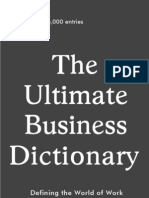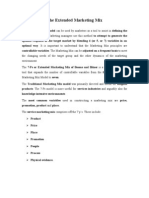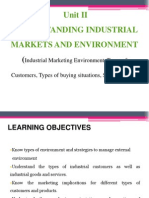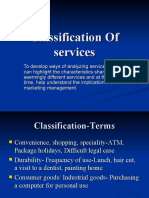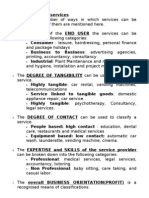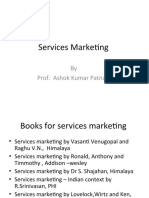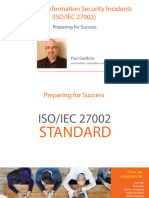Four Broad Categories of Services
Four Broad Categories of Services
Uploaded by
phoe_koCopyright:
Available Formats
Four Broad Categories of Services
Four Broad Categories of Services
Uploaded by
phoe_koOriginal Description:
Copyright
Available Formats
Share this document
Did you find this document useful?
Is this content inappropriate?
Copyright:
Available Formats
Four Broad Categories of Services
Four Broad Categories of Services
Uploaded by
phoe_koCopyright:
Available Formats
Clarify the differences among the four broad categories of services, provide examples for each, and explain
the service management challenges related to each of the four categories.
There are major differences among services depending on what is being processed. Services can “process”
people, physical objects, and data, and the nature of the processing can be tangible or intangible. Tangible
actions are performed on people’s bodies or to their physical properties. Intangible actions are performed on
people’s minds or to their intangible assets. The classification of services into four broad categories. They are
people-processing, possession-processing, mental stimulus processing and information processing.
Name of the Service Name of the Service Act
Act People Possessions
People Processing Possession Processing
(Services directed at people’s bodies): (Services directed at physical possessions):
Tangible Actions • Passenger transportation • Freight transportation
• Health care • Repair and maintenance
• Beauty Salons • Warehousing
Mental Stimulus Processing Information Processing
(Services directed at people’s mind): (Services directed at intangible assets):
Intangible Actions • Advertising/PR • Accounting
• Art’s and entertainment • Banking
• Broadcasting • Insurance
People Processing
➢ The action/work/service do on direct on people body, with equipment and without equipment.
➢ A physical location where people or machines/ both, create and deliver service benefits to customers.
➢ In People Process services customer must prepare for co-ordination with the service operator, for example,
Hair cutting, customer must follow instruction given by hair cutter. Follow the instruction given by doctor
during the check up patient body.
➢ Time required of customers in people processing services varies widely. Customer satisfied after completed
services to reach his/her destination, satisfied his hunger or is now sporting clean and stylishly cut hair or has
a good night’s sleep away from home or is now in physically better health.
➢ Example of people processing
• Passenger transportation
• Health care
• Beauty salons
• Fitness centers
• Restaurants
Possession Processing
➢ The service directed at physical possession (work/action/service do on customer’s physical good’s).
➢ Customers are less physically involved with this type of service.
➢ Example of Possession Processing
• Freight transportation
• Repair and maintenance
• Warehousing
• Refueling
• Disposal
Page 1 of 2
Mental Stimulus Processing
➢ The work/activity/service with effect human mind. (Intangible)
➢ In this service customer must investment of time and mental effort.
➢ It can be inventoried. For example, customer’s favorite movies/songs download from source and can store
in their own gadgets and use it when they want.
➢ Example of Mental Stimulus Processing
• Advertising/PR
• Art’s and entertainment
• Broadcasting
• Education
• Religion
Information Processing
➢ Information is the most intangible form of service output, but it may be transformed into tangible forms such
as letters, reports, books, CDs or DVDs.
➢ That are highly dependent on the effective collection and processing of information are financial service and
professional services such as accounting, law, marketing, research and management consulting.
➢ Example of information processing
• Accounting
• Banking
• Insurance
• Programming
• Research
Page 2 of 2
You might also like
- What Are The Factors Stimulating The Transformation of The Service Marketing EnvironmentDocument3 pagesWhat Are The Factors Stimulating The Transformation of The Service Marketing Environmentprasanth v60% (10)
- A Study of Marketing Strategy in KFCDocument21 pagesA Study of Marketing Strategy in KFCDhaval Patel67% (3)
- 6.the Servuction ModelDocument3 pages6.the Servuction ModelMAHENDRA SHIVAJI DHENAK93% (40)
- Mechanisms of Stockholders AccountabilityDocument58 pagesMechanisms of Stockholders AccountabilitySara Budhiraja50% (4)
- Service Marketing Lecture NotesDocument201 pagesService Marketing Lecture NotesJase Jbm100% (1)
- UNIT 4 Service Delivery and PromotionDocument14 pagesUNIT 4 Service Delivery and PromotionBala Subramani100% (4)
- Service MarketingDocument22 pagesService MarketingDrBharti KeswaniNo ratings yet
- Benefits of International MarketingDocument1 pageBenefits of International Marketingrahulravi4u50% (8)
- Issues and Challenges in Service MarketingDocument10 pagesIssues and Challenges in Service MarketingDivya GirishNo ratings yet
- Strategies For Delivering Service Quality Through PeopleDocument21 pagesStrategies For Delivering Service Quality Through PeopleDhanush RNo ratings yet
- 7 Main Objectives of Sales PromotionDocument7 pages7 Main Objectives of Sales Promotionravi_nyse67% (3)
- Study Report On HondaDocument62 pagesStudy Report On HondaAkansha Mehta67% (3)
- Services Marketing Notes PDFDocument283 pagesServices Marketing Notes PDFakhil89% (108)
- Consumer Behaviour in ServicesDocument62 pagesConsumer Behaviour in ServicesGagan KauraNo ratings yet
- The Ultimate Business Dictionary (Team Nanban) (TPB)Document663 pagesThe Ultimate Business Dictionary (Team Nanban) (TPB)Fred Dickson88% (8)
- Service Vision Strategy - Ch2 PDFDocument20 pagesService Vision Strategy - Ch2 PDFRavi Satyapal100% (1)
- Service Marketing Environment and Other Factors Affecting Marketing EnvironmentDocument31 pagesService Marketing Environment and Other Factors Affecting Marketing EnvironmentDilshaad Shaikh83% (6)
- Mba III Services Management (14mbamm303) NotesDocument113 pagesMba III Services Management (14mbamm303) NotesZoheb Ali K100% (15)
- Services CapeDocument3 pagesServices Capezakirno19248No ratings yet
- Service Marketing: Service Failures - Recovery StrategiesDocument25 pagesService Marketing: Service Failures - Recovery StrategiesReyad100% (1)
- Models in Service MarketingDocument4 pagesModels in Service Marketingrajendrakumar33% (3)
- Molecular Model & Servuction Model of A UniversityDocument4 pagesMolecular Model & Servuction Model of A UniversityShaté Itminan93% (14)
- Channel Information SystemDocument2 pagesChannel Information SystemBrian Duela100% (1)
- A Study On Marketing Strategy of Milky Bar ChocolateDocument43 pagesA Study On Marketing Strategy of Milky Bar ChocolateThakur Harshvardhan100% (3)
- Molecular ModelDocument3 pagesMolecular Modelrajendrakumar67% (3)
- Service Encounters: Encounter CascadeDocument2 pagesService Encounters: Encounter Cascadebooklovershilpa100% (1)
- Objectives of International PricingDocument3 pagesObjectives of International Pricingविशाल गुप्ताNo ratings yet
- Case Study - SolvedDocument3 pagesCase Study - SolvedMoeen100% (4)
- Significance of Rural MarketDocument10 pagesSignificance of Rural MarketPRIYA GHOSH100% (2)
- Service Marketing: Services Marketing TriangleDocument10 pagesService Marketing: Services Marketing TriangleReyadNo ratings yet
- Recent Developments in MISDocument4 pagesRecent Developments in MISPRACHI DAS83% (6)
- The Extended Marketing MixDocument6 pagesThe Extended Marketing MixMAHENDRA SHIVAJI DHENAK33% (3)
- Chapter-9 - Service Innovation and DesignDocument15 pagesChapter-9 - Service Innovation and Designsaad201340% (5)
- Chapter-3 (A) Building of Advertising ProgrammeDocument31 pagesChapter-3 (A) Building of Advertising ProgrammeSonia100% (1)
- Sap PPT FinalDocument7 pagesSap PPT FinalChitra ChauhanNo ratings yet
- Service Marketing For BBADocument58 pagesService Marketing For BBALakshay Dhamija67% (3)
- Five Interdisciplinary Dimensions of Consumer Behaviour 1. EconomicDocument13 pagesFive Interdisciplinary Dimensions of Consumer Behaviour 1. EconomicRima Parekh100% (3)
- Customer Role in Service DeliveryDocument13 pagesCustomer Role in Service DeliveryDevinder ChoudharyNo ratings yet
- 1 Marketing Management - Case Study Analysis and DevelopementDocument3 pages1 Marketing Management - Case Study Analysis and DevelopementSayantan Roy100% (2)
- Facilitating Supplementary ServicesDocument36 pagesFacilitating Supplementary ServicesGulshan Bhandari82% (11)
- Industrial Marketing Environment Unit 2Document40 pagesIndustrial Marketing Environment Unit 2Mayur N Malviya75% (4)
- Conclusions and SuggestionsDocument9 pagesConclusions and SuggestionsSamiksha BargudeNo ratings yet
- G-5, Effective Delivery Through Employees, Intermediaries & Customer ParticipationDocument17 pagesG-5, Effective Delivery Through Employees, Intermediaries & Customer ParticipationDolores H. RichmanNo ratings yet
- Four Broad Categories of ServiceDocument3 pagesFour Broad Categories of ServiceAlwin K AnilNo ratings yet
- Classification of ServicesDocument8 pagesClassification of ServicestarunewitNo ratings yet
- Customer Behavior in Service MarketingDocument28 pagesCustomer Behavior in Service MarketingVivek Singh RanaNo ratings yet
- Presented By: Apple Bernadette DC. ManubayDocument10 pagesPresented By: Apple Bernadette DC. ManubayApple DC ManubayNo ratings yet
- Classification of ServicesDocument11 pagesClassification of ServicesPrerana ParekhNo ratings yet
- Customer Behavior in Service MarketingDocument32 pagesCustomer Behavior in Service MarketingSruthy KrishnaNo ratings yet
- Unit-3 & 4 SMDocument27 pagesUnit-3 & 4 SMjayant besarwadiaNo ratings yet
- Consumer Behavior in Service MarketingDocument31 pagesConsumer Behavior in Service MarketingAnjaliNo ratings yet
- Classification of ServicesDocument2 pagesClassification of ServicesPushkar KumarNo ratings yet
- Chap 01 Intro To ServicesDocument16 pagesChap 01 Intro To Servicespn8yxyjzf8No ratings yet
- Lesson 1 Introducing Services r2Document30 pagesLesson 1 Introducing Services r2Chelsea Famoso CabinbinNo ratings yet
- Amity Business School: Classification of ServicesDocument8 pagesAmity Business School: Classification of ServicesKarim ManjiyaniNo ratings yet
- Services Marketing: by Prof. Ashok Kumar PatnaikDocument95 pagesServices Marketing: by Prof. Ashok Kumar Patnaikgurus025No ratings yet
- Classification of Services: - Classifications Can Be Done On FollowingDocument7 pagesClassification of Services: - Classifications Can Be Done On FollowingSatender SinghNo ratings yet
- Classification of Services 2010Document17 pagesClassification of Services 2010Kunal SinghNo ratings yet
- Services Marketing: Presented By: Muskan Jaiswal BBA-3 Sem Doon Business SchoolDocument33 pagesServices Marketing: Presented By: Muskan Jaiswal BBA-3 Sem Doon Business SchoolMuskanNo ratings yet
- Mfs Mod1Document62 pagesMfs Mod1aagamshah10520No ratings yet
- Revolution of Business-Service SectorDocument23 pagesRevolution of Business-Service Sector2305002030No ratings yet
- Pon Cad Scaffolding: With Videos About The Program FeaturesDocument10 pagesPon Cad Scaffolding: With Videos About The Program Featuresphoe_koNo ratings yet
- Study Note For Exam (Principles of Marketing)Document14 pagesStudy Note For Exam (Principles of Marketing)phoe_koNo ratings yet
- Final Exam Long QuestionDocument6 pagesFinal Exam Long Questionphoe_ko100% (1)
- Effective Communications in Business: Chapter (1) - Exercises (3)Document9 pagesEffective Communications in Business: Chapter (1) - Exercises (3)phoe_koNo ratings yet
- GM Unit 6 MotivationDocument18 pagesGM Unit 6 Motivationphoe_koNo ratings yet
- Marketers Can Study Actual Consumer Purchases: Product Price Place Product Want Price CostDocument1 pageMarketers Can Study Actual Consumer Purchases: Product Price Place Product Want Price Costphoe_koNo ratings yet
- Unit 8 Managing Quality: Total Quality ManagementDocument7 pagesUnit 8 Managing Quality: Total Quality Managementphoe_koNo ratings yet
- SWOT AnalysisDocument26 pagesSWOT Analysisphoe_koNo ratings yet
- LMA) အိမ္တြင္းလွ်ပ္စစ္ႀကိဳးသြယ္ဆားကစ္ပတ္လမ္းမ်ား ဦးအုန္းၿမိဳင္ PDFDocument178 pagesLMA) အိမ္တြင္းလွ်ပ္စစ္ႀကိဳးသြယ္ဆားကစ္ပတ္လမ္းမ်ား ဦးအုန္းၿမိဳင္ PDFbetter tomorrow86% (7)
- Jean Louise Briaud - Foundations For Transmission Line Towers (Geotechnical Special Publication No 8) (1987, Amer Society of Civil Engineers) PDFDocument194 pagesJean Louise Briaud - Foundations For Transmission Line Towers (Geotechnical Special Publication No 8) (1987, Amer Society of Civil Engineers) PDFphoe_koNo ratings yet
- Linear Programming QuestionsDocument6 pagesLinear Programming QuestionsMaranathaNo ratings yet
- Kinder LAS Q2 Week-15Document71 pagesKinder LAS Q2 Week-15Judy Mae LacsonNo ratings yet
- Candidate - Klarna Balance - Onboarding HypothesisDocument2 pagesCandidate - Klarna Balance - Onboarding Hypothesisd rNo ratings yet
- Manual de Calderas Cleaver Brooks 250-Hp 300-Hp 350-HpDocument194 pagesManual de Calderas Cleaver Brooks 250-Hp 300-Hp 350-HpAlexis CruzNo ratings yet
- A Guide To The Good Life Summary PDFDocument4 pagesA Guide To The Good Life Summary PDFaashish1507No ratings yet
- DataStage MatterDocument81 pagesDataStage MatterShiva Kumar0% (1)
- 13-Curriculum Development Mcqs PDF For All Competitive ExamsDocument13 pages13-Curriculum Development Mcqs PDF For All Competitive Examsghs shahyousafNo ratings yet
- Dual 5.8W Audio Power Amplifier Circuit: Ics For Audio Common UseDocument4 pagesDual 5.8W Audio Power Amplifier Circuit: Ics For Audio Common UseNakia BuenabajoNo ratings yet
- Curriculum Map KeycodeDocument18 pagesCurriculum Map Keycodeapi-510144682No ratings yet
- An5093 Getting Started With stm32g4 Series Hardware Development Boards StmicroelectronicsDocument35 pagesAn5093 Getting Started With stm32g4 Series Hardware Development Boards StmicroelectronicsnounkhayNo ratings yet
- Tutorial PDFDocument145 pagesTutorial PDFSatadru BeraNo ratings yet
- Comparing Methods For Calculating Z FactorDocument5 pagesComparing Methods For Calculating Z FactorplplqoNo ratings yet
- Experimental Investigation On Cement With Waste Glass Powder in Pervious ConcreteDocument5 pagesExperimental Investigation On Cement With Waste Glass Powder in Pervious ConcreteReine AceretNo ratings yet
- Getz Manufacturing Vacufill Systems Instruction ManualDocument0 pagesGetz Manufacturing Vacufill Systems Instruction ManualjohnneracalNo ratings yet
- Geotechnical Investigation Report: Date of Test: 18.09.2020 TO 19.09.2020Document23 pagesGeotechnical Investigation Report: Date of Test: 18.09.2020 TO 19.09.2020Koustav MajumdarNo ratings yet
- Instrumentation Pocket GuideDocument59 pagesInstrumentation Pocket Guideerwin.hindartoNo ratings yet
- Techniques and Exercises Used in Team BuildingDocument32 pagesTechniques and Exercises Used in Team Buildinggulabrani0% (2)
- Counting SortDocument59 pagesCounting SortKrisha DavdaNo ratings yet
- Revised BOQ ElectricalDocument37 pagesRevised BOQ ElectricalAbdallah ElabassyNo ratings yet
- 1 Information Security Incidents Iso Iec 27002 m1 SlidesDocument23 pages1 Information Security Incidents Iso Iec 27002 m1 SlidesRavi Kumar GaliNo ratings yet
- Ol 900 EngDocument1 pageOl 900 EngOmar SaaedNo ratings yet
- Blockchain Book NotesDocument58 pagesBlockchain Book Notessoman77kumarNo ratings yet
- Seed Treatment With Liquid Microbial Consortia For Germination and Vigour Improvement in Tomato (Solanum Lycopersicum L.)Document6 pagesSeed Treatment With Liquid Microbial Consortia For Germination and Vigour Improvement in Tomato (Solanum Lycopersicum L.)Shailendra RajanNo ratings yet
- Decision Making ProcessDocument7 pagesDecision Making Processspencer2003No ratings yet
- GM Vs FMDocument6 pagesGM Vs FMSagar PatelNo ratings yet
- M760 QInstall User Manual 01 R12Document36 pagesM760 QInstall User Manual 01 R12çağlar ünalNo ratings yet
- Goalsheet Abhishek Singh 2612624Document7 pagesGoalsheet Abhishek Singh 2612624myself1613030No ratings yet
- Rebot of Industrial VisitDocument5 pagesRebot of Industrial VisitKiran L CNo ratings yet
- F.sc.I Math Question Bank CH# 2Document13 pagesF.sc.I Math Question Bank CH# 2Adnan FaizNo ratings yet
- 5 Thompson Coupling and Complexity Final PDFDocument7 pages5 Thompson Coupling and Complexity Final PDFAshwiniNo ratings yet














